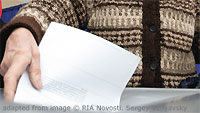NEWSLINK: Political reforms failed to change anything in Russian politics; Failed Reforms: Political Reforms: Gubernatorial Elections Resemble Appointments, Competition Among Parties Remains Inadequate

[Failed Reforms: Political Reforms: Gubernatorial Elections Resemble Appointments, Competition Among Parties Remains Inadequate – Vedomosti – Maria Zheleznova – January 15, 2013 – no public link to English-language version]
Vedomosti covers analysis by Alexei Kudrin’s Civil Initiatives Committee (CIC) that finds that gubernatorial elections resembled appointments, competition among political parties remained inadequate, and turnout continued to decline.
Changes in party registration fueled more registrations but had little impact on the landscape of actual political power:
Expert group headed by Arkady Lyubarev drew a report for Aleksei Kudrin’s CIC. According to the document, political reforms launched in May 2012 (simpler registration procedures for political parties, return to gubernatorial elections, no more collection of signatures by candidates nominated by parties) had but an insignificant effect on the political situation in the country.
At first sight, liberalization of registration procedures for political parties seems to be a smashing success … almost 280 steering committees were established. The Justice Ministry registered 46 new political parties. Twenty-three parties earned the right to participate in regional elections … and nearly all of them did participate in the elections in October 2012. And yet, effective political parties (i.e. the ones that carry weight in Russian politics) dropped to below the average over the last two years. No real changes actually occurred. The same four political parties represented in the federal Duma occupy practically all regional legislatures. Presence of new political parties in parliaments across Russia is purely nominal.
Turnout has not been increasing:
Moreover, the turnout in most Russian regions was equal to or below the value recorded during previous elections. It means that new political parties failed to bring new voters to polling stations.
The “filter” is said to have encumbered elections for governors:
According to Lyubarev, reinstallation of direct gubernatorial elections encumbered by the so called municipal filter turned the whole procedure into a sham. “So far as I know, the CPRF alone actually went ahead and collected signatures for its candidates among sympathetic municipal lawmakers. As for all the rest, it was mostly United Russia lawmakers who put signatures in their support… meaning that United Russia chose its own sparring partners. Mostly among the so called tame or pocket opposition, of
course,” he said. Neither were self-nominees permitted anywhere in gubernatorial elections in 2011. Lyubarev called it an additional encroachment on political competition.
Would-be political reform, it was argued, merely took a form preferable to those already in power:
Lyubarev said, “By and large, the political reforms were an imitation. The new laws failed to address the key problems of democratic elections.”
“These reforms shape the political system as the Presidential Administration prefers it,” said expert Andrei Buzin.
Political scientist Alexei Makarkin commented, “Return to direct gubernatorial elections and installation of the municipal filter… is a unique combination of reforms and counter-reforms.”
Some voices argue the changes represent a step forward, or will at least make politics different and more complex, as others push for greater reform:
“All things considered, direct gubernatorial elections are a breakthrough all the same. They will play their part yet,” said Voice Association Executive Director Liliya Shibanova.
According to Lyubarev, it is necessary to aspire to full-fledged political reforms including the permission to form political alliances…
“But political alliances and the combined system of Duma election will make the correlation of forces all the more complicated or tangled… These years are going to be much more interesting than 2012 was,” said political scientist Igor Bunin.
[no public link to English-language version]
